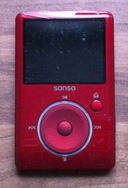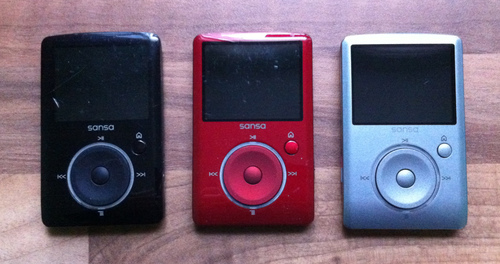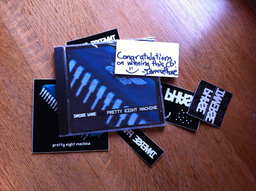
After a relatively long period of flux, I've managed to settle into a routine
where I've got all the time I can dedicate to open source stuff bunched
together: every Tuesday night. I've started calling it "Debian Day", although
Debian won't get all that time exclusively.
One evening a week doesn't sound like much, but that's unfortunately a
realistic amount given my other commitments. Still, having a firm idea of how
much resource I have makes planning what I can and can't do much easier. It
also means I need to be quite selective about what I spend my time on.
This also impacts the type of interactions I can use. I can respond to email,
bugs, etc., but I cannot effectively interact with folks on IRC, for example:
the period between windows is too large for it to work effectively. Therefore,
I can't work reliably with any team or area of Debian that
relies on IRC to
get things done.
Tonight, then. I have recently been ripping some CDs, a task for which I use
grip, despite it long since having
been dropped by Debian. It still works very well, whereas
Sound
Juicer, which still pops up whenever I
insert an audio CD,
does not.
I've been interested in helping out with Debian GNOME packaging for a while,
and it seems the issue has been fixed upstream, but after asking around in
#debian-gnome, the root cause is that the newer musicbrainz API packages have
not been uploaded to Debian. (
the existing package uses the old
API).
Two separate people appear to have been working on a new Music Brainz package,
but neither filed an ITP bug. I've spent the largest chunk of my Debian time
just trying to figure out what has been going on, sadly, but at least there's
the likelyhood this will be fixed for wheezy.
There's also the
tail end of a musicbrainz-2.1
transition finishing
up.
Another thing I considered this evening was the future of
debgtd
in Debian stable. On reflection, and after sitting on the fence
for several
months, I've decided
I don't have the time to fix it up enough to have it ready for wheezy, so with
regret I've filed a removal bug. With any luck, at some point in the wheezy
cycle I'll manage to put more time towards this, because I think it addresses a
genuine need and could be useful to people.
Finally, whenever I sit down and look at Debian stuff to finish up, I have a
strong temptation to fix some issues belonging to the
games team. In
particular, Gustavo Panizzo has put a lot of work into
vavoom
packages, but sadly
his requests
for sponsorship are falling on deaf
ears. There's also
Johey Shmit's
work on packaging
zdoom which needs
some attention to finish removing some embedded libraries. I have to keep
reminding myself I left the team for a reason, to focus on something else, and
finding that something else should be the priority.
So all in all not the most uplifting evening: I'm starting to think I simply
couldn't work effectively with the Debian GNOME team without being able to
dedicate more time to use IRC effectively; I spent more time that could be
necessary figuring out a bunch of other folks have potentially wasted each
other's time by working on packages and not filing ITPs; and I've removed one
of my own packages from the distribution altogether.
It's not all doom and gloom, though: last week
I packaged Simon Howard's
lhasa, a library and tool for
decompressing LHA files, as used by various old DOS games. (See? I just can't
escape that stuff ) I also managed to 'resolve' two bup bugs,
one
RC. I also finished
transitioning from
my old PGP key to
my new one.
 About two years ago, I wrote about moving to a Sandisk Sansa Fuze
as my music player. I transitioned from a 40G, HDD-based iRiver to an 8G
flash-based player, with an additional 32G supplied by a micro SD card, both
running the rockbox open-source firmware.
Of course, my music collection has grown over the last few years and so I
needed to find another solution. That solution is
another Sansa Fuze!
This was actually my interim solution, this time with 4G internal capacity
(didn't matter too much) with another 32G microsd and a rubber band. It turns
out that managing four storage devices (two SDs and two embedded storages) is a
complete nightmare. However, as luck would have it, I learned that the new,
larger capacity SDXC cards can be made to work in some SD readers, including
the Sansa Fuze. At around this time, my original player started to malfunction
and so,
another Sansa Fuze, again!
It took three attempts to get a 64G microsd: the first was faulty or fake, the
second never turned up. Third times a charm, and a third sansa fuze (to get 8G
internal capacity) completes the story.
For the sansa fuze, to get a 64G microsd to work, one needs to change the
partition type to 0x0c (W95 FAT32 (LBA)) and reformat with FAT32.
(Interestingly that's actually hard to do for Windows users, as Win 7 refuses
to offer FAT32 for flash devices over 32G in capacity by default).
I now have approximately 67.7G of storage on a single device and all my music
in one place again (albeit two storage locations) which feels surprisingly
good!
About two years ago, I wrote about moving to a Sandisk Sansa Fuze
as my music player. I transitioned from a 40G, HDD-based iRiver to an 8G
flash-based player, with an additional 32G supplied by a micro SD card, both
running the rockbox open-source firmware.
Of course, my music collection has grown over the last few years and so I
needed to find another solution. That solution is
another Sansa Fuze!
This was actually my interim solution, this time with 4G internal capacity
(didn't matter too much) with another 32G microsd and a rubber band. It turns
out that managing four storage devices (two SDs and two embedded storages) is a
complete nightmare. However, as luck would have it, I learned that the new,
larger capacity SDXC cards can be made to work in some SD readers, including
the Sansa Fuze. At around this time, my original player started to malfunction
and so,
another Sansa Fuze, again!
It took three attempts to get a 64G microsd: the first was faulty or fake, the
second never turned up. Third times a charm, and a third sansa fuze (to get 8G
internal capacity) completes the story.
For the sansa fuze, to get a 64G microsd to work, one needs to change the
partition type to 0x0c (W95 FAT32 (LBA)) and reformat with FAT32.
(Interestingly that's actually hard to do for Windows users, as Win 7 refuses
to offer FAT32 for flash devices over 32G in capacity by default).
I now have approximately 67.7G of storage on a single device and all my music
in one place again (albeit two storage locations) which feels surprisingly
good!


